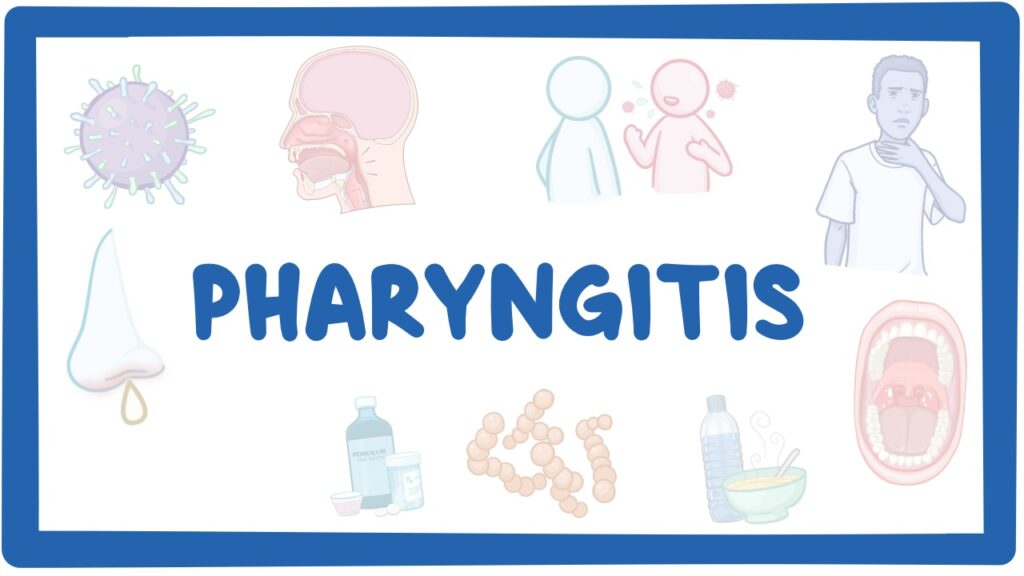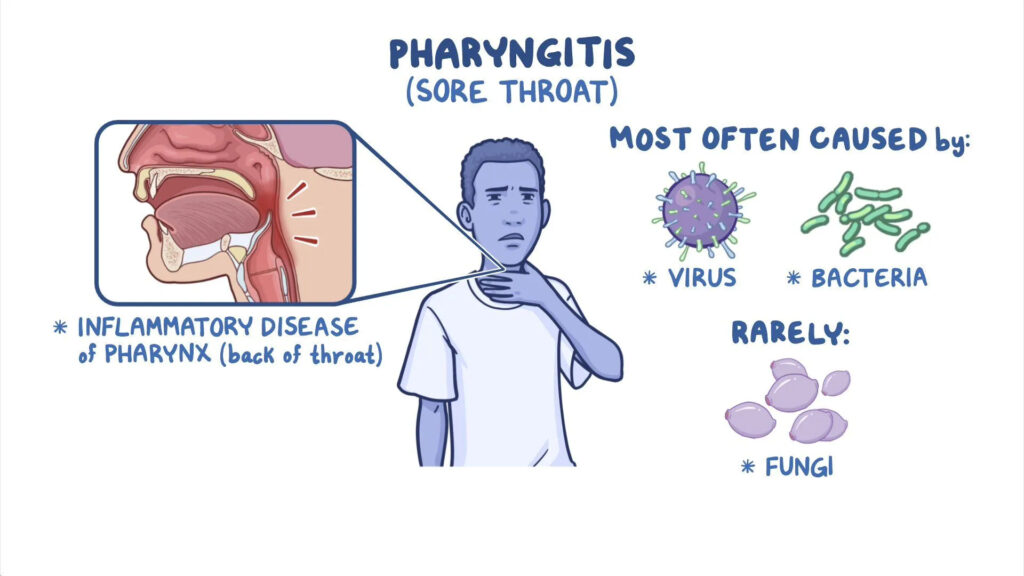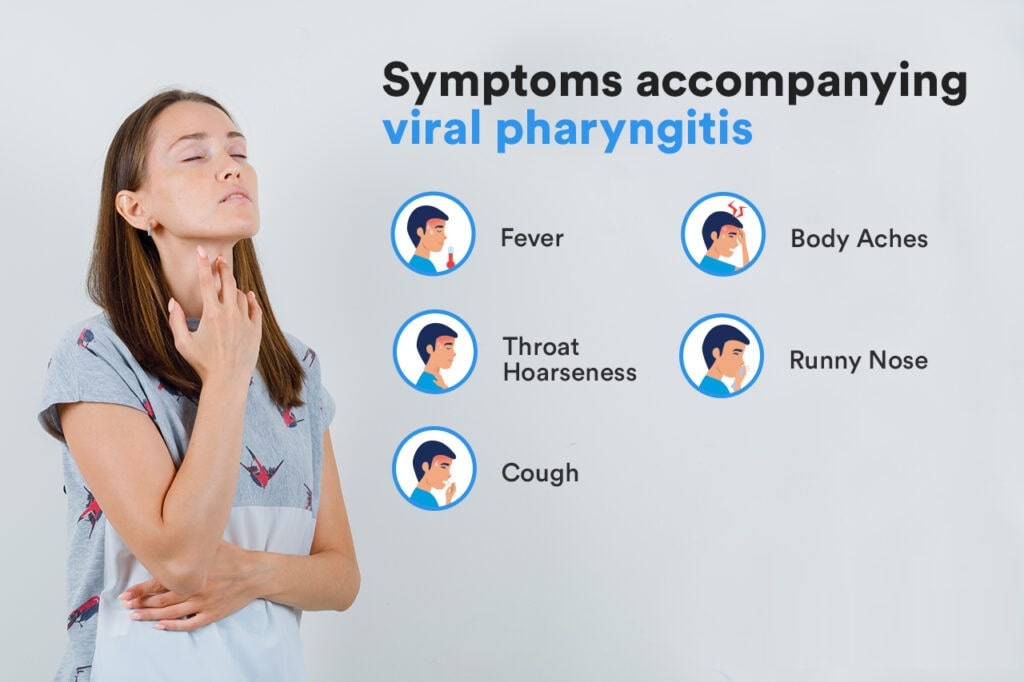WHAT IS A SORE THROAT?
A sore throat is a pain, scratchiness, or irritation of the throat that usually worsens when you swallow. The most frequent cause of a sore throat (pharyngitis) is a viral infection, like a cold or the flu. A sore throat caused by a virus goes away by itself.
Strep throat (streptococcal infection), a less common type of sore throat caused by bacteria, needs treatment with antibiotics to prevent complications. Other less common causes of sore throat may need more complex treatment.
SYMPTOMS
Symptoms of a sore throat could vary depending on the cause. Signs and symptoms may include:
- Pain or a scratchy feeling within the throat
- Pain that gets worse with swallowing or talking
- Difficulty swallowing
- Sore, inflamed glands in your neck or jaw
- Swollen, red tonsils
- White patches or pus on your tonsils
- A hoarse or muffled voice
INFECTIONS CAUSING A SORE THROAT MAY RESULT IN OTHER SIGNS AND SYMPTOMS, INCLUDING:
- Fever
- Cough
- Runny nose
- Sneezing
- Body aches
- Headache
- Nausea or vomiting
WHEN SHOULD YOU SEE A DOCTOR?
Take your child to a doctor if your child’s sore throat does not go away with the first drink in the morning, recommends the American Academy of Pediatrics.
Get immediate care if your child has severe signs and symptoms like:
- Difficulty breathing
- Difficulty swallowing
- Uncommon drooling, which may indicate an inability to swallow
If you are an adult, see your doctor if you have a sore throat and any of the following associated problems, according to the American Academy of Otolaryngology-Head and Neck Surgery:
- A sore throat that is serious or lasts longer than 1 week
- Difficulty swallowing
- Difficulty breathing
- Difficulty opening your mouth
- Joint pain
- Earache
- Rash
- Fever higher than 101 F (38.3 C)
- Blood in your saliva or phlegm
- Frequently recurring sore throats
- A lump in your neck
- Hoarseness lasting more than 2 weeks
- Swelling in your neck or face
CAUSES
Viruses that cause the common cold and the flu also cause the majority of sore throats. Less frequently, bacterial infections cause sore throats.
Viral infections
Viral diseases that cause a sore throat are:
- Common cold
- Flu (influenza)
- Mono (mononucleosis)
- Measles
- Chickenpox
- Coronavirus disease 2019 (COVID-19)
- Croup — a common childhood disease characterized by a harsh, barking cough
Bacterial infections
Many bacterial infections could cause a sore throat. The most frequent is Streptococcus pyogenes (group A streptococcus) which causes strep throat.
Other causes
Other causes of a sore throat are:
- Allergies – Allergies to pet dander, molds, dust, and pollen could cause a sore throat. The problem might be complicated by a postnasal drip, which can irritate and inflame the throat.
- Dryness – Dry indoor air could make your throat feel rough and scratchy. Breathing through your mouth — often because of chronic nasal congestion — also could cause a dry, sore throat.
- Irritants – Outdoor air pollution and indoor pollution like tobacco smoke or chemicals can cause a chronic sore throat. Chewing tobacco, drinking alcohol, and eating spicy foods also could irritate your throat.
- Muscle strain – You could strain muscles in your throat by yelling, talking loudly, or talking for long periods without rest.
- Gastroesophageal reflux disease (GERD) –GERD is a digestive system disorder in which stomach acids return to the food pipe (esophagus). Other signs or symptoms might include heartburn, hoarseness, regurgitation of stomach contents, and the sensation of a lump in your throat.
- HIV infection – A sore throat and other flu-like symptoms at times appear early after someone is infected with HIV. Also, someone who is HIV-positive might have a chronic or recurring sore throat due to a fungal infection known as oral thrush or due to a viral infection called cytomegalovirus (CMV), which could be severe in people with compromised immune systems.
- Tumors – Cancerous tumors of the throat, tongue, or voice box (larynx) could cause a sore throat. Other signs or symptoms might include hoarseness, difficulty swallowing, noisy breathing, a lump in the neck, and blood in saliva or phlegm.
Sometimes, an infected area of tissue (abscess) in the throat or swelling of the small cartilage “lid” that covers the windpipe (epiglottitis) could cause a sore throat. Both could block the airway, creating a medical emergency.
RISK FACTORS
Although anyone can get a sore throat, some factors make you more vulnerable, including:
- Age – Children and teens are more likely to develop sore throats. Children ages 3 to 15 are also more likely to have strep throat, the most common bacterial infection related to a sore throat.
- Exposure to tobacco smoke – Smoking and secondhand smoke could irritate the throat. The use of tobacco products also raises the risk of cancers of the mouth, throat, and voice box.
- Allergies – Seasonal allergies or current allergic reactions to dust, molds, or pet dander make developing a sore throat more likely.
- Exposure to chemical irritants – Particles in the air from burning fossil fuels and common household chemicals could cause throat irritation.
- Chronic or frequent sinus infections – Drainage from your nose could irritate your throat or spread infection.
- Close quarters – Viral and bacterial infections spread easily everywhere people gather, whether in child care centers, classrooms, offices, or airplanes.
- Weakened immunity – You are more vulnerable to infections in general if your resistance is low. Common causes of lowered immunity involve HIV, diabetes, treatment with steroids or chemotherapy drugs, stress, fatigue, and poor diet.
PREVENTION
The best way to prevent sore throats is to avoid the germs that cause them and to practice proper hygiene. Follow these tips and teach your child how to do the same:
- Wash your hands thoroughly and frequently for at least twenty seconds, particularly after using the toilet, before and after eating, and after sneezing or coughing.
- Avoid touching your face. Do not touch your eyes, nose, or mouth.
- Avoid sharing food, drinking glasses, and utensils.
- Cough or sneeze into a tissue and throw it out, and then wash your hands. If necessary, sneeze into your elbow.
- Use alcohol-based hand sanitizers as an alternative to washing hands when soap and water are not available.
- Avoid touching public phones and drinking fountains from your mouth.
- Regularly clean and disinfect phones, doorknobs, light switches, remotes, or computer keyboards. When you travel, clean phones, light switches, or remotes in your hotel room
- Avoid close contact with those who are ill or have symptoms.
DIAGNOSIS
Your or your child’s doctor might review the symptoms and medical history. He or she may conduct a physical examination that includes:
- Using a lighted instrument to look at the throat, and probably the ears and nasal passages
- Gently feeling the neck to see if there are swollen glands (lymph nodes)
- Listening to your or your child’s breathing through a stethoscope
Throat swab
In many instances, doctors use a simple test to detect streptococcal bacteria, the cause of strep throat. The doctor rubs a sterile swab over the back of the throat to get a sample of secretions and sends the sample to a laboratory for testing. Many clinics are equipped with a laboratory that can get a test result for a rapid antigen test within a few minutes. However, a second, often more reliable test, known as a throat culture, is sometimes sent to a laboratory that returns results within 24 to 48 hours.
Rapid antigen tests are not as sensitive, although they could detect strep bacteria quickly. Because of this, the doctor may send a throat culture to a laboratory to test for strep throat if the antigen test comes back negative.
In some cases, doctors might use a molecular test to detect streptococcal bacteria. In this test, a doctor swipes a sterile swab on the back of the throat to get a sample of secretions. The sample is tested in a laboratory. Your or your child’s doctor might have accurate results within a few minutes.
TREATMENT
A sore throat caused by a viral infection usually lasts five to seven days and does not usually need medical treatment. Antibiotics do not help treat a viral infection.
To relieve pain and fever, many people turn to acetaminophen (Tylenol, others) or other mild pain relievers.
Consider giving your child over-the-counter pain medications designed for infants or children, like acetaminophen (Children’s Tylenol, FeverAll, others) or ibuprofen (Children’s Advil, Children’s Motrin, others), to relieve symptoms.
Never give aspirin to children or teenagers because it has been linked to Reye’s syndrome, a rare but possibly life-threatening condition that causes swelling in the liver and brain.
Treating bacterial infections
If your or your child’s sore throat is caused by a bacterial infection, your doctor or pediatrician will give you antibiotics.
You or your child should take the full course of antibiotics as prescribed even if the symptoms are gone. Failure to take all of the medication as directed could result in the infection worsening or spreading to other parts of the body.
Not completing the full course of antibiotics to treat strep throat could increase a child’s risk of rheumatic fever or severe kidney inflammation.
Speak to your doctor or pharmacist about what to do if you forget a dose.
Other treatments
If a sore throat is a symptom of a condition other than a viral or bacterial infection, other treatments will likely be considered depending upon the diagnosis.
If you or anyone you know is suffering from sore throat, our expert providers at Specialty Care Clinics will take care of your health and help you recover.
Call 469-545-9983 to book a telehealth appointment for an at-home check-up.




